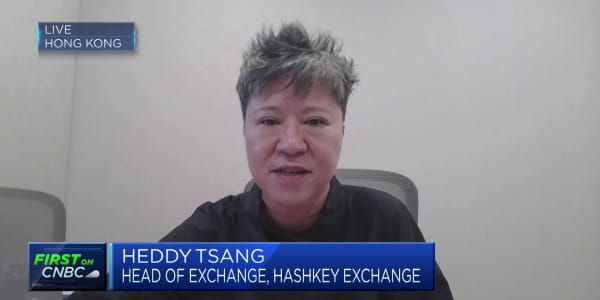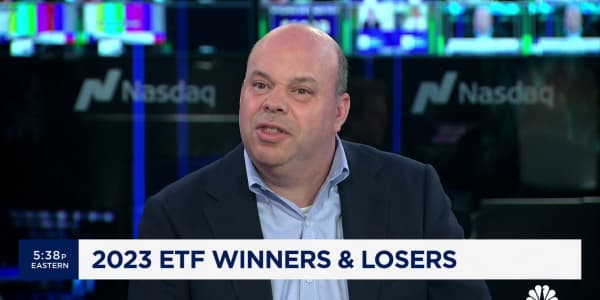The FANG group of stocks has entered a correction, down more than 10 percent from their high, and they have taken down most of the tech sector with them in the past week. The biggest questions for investors will be to determine when the selling will end, and if the tech stocks — Facebook, Netflix, Amazon and Alphabet (Google) — which have dominated market returns in recent history, will again be trading at attractive valuations. The current portfolio holdings of an ETF dedicated to focused tech-stock investing suggests that it is not time to buy into the tech dip yet.
Into earning season, the tech sector had contributed roughly 67 percent of the S&P 500 return, led by Amazon, Microsoft, Apple, Netflix and Facebook, according to S&P Global data, as of July 13. Google was also in the top 10 among S&P 500 stocks, providing the biggest contribution to the S&P 500 return. The only non-tech stocks were MasterCard and Visa. Facebook's one-day decline last week of roughly $120 billion was the largest single-day decline in tech history. However, two of the top 10 one-day declines of all time occurred earlier in 2018 and hit other tech giants, Amazon and Alphabet, both of which ultimately rebounded strongly.
The AdvisorShares New Tech and Media ETF (FNG) has a 14 percent weighting to cash, its largest holding right now, larger than any weighting to a tech stock. The ETF is holding no Facebook stock at all. Amazon and Alphabet are among its top five holdings, with 8.5 percent of the ETF in Amazon and 5.3 percent in Alphabet shares, according to its daily holdings report. Netflix is held at a 2 percent position, the third-smallest weighting among all of the tech stocks in the FNG ETF.
The higher weightings to Amazon and Alphabet are aligned with stronger performance of these stocks relative to Facebook and Netflix. Even as they are weighed down by the tech sector, their earnings reports were strong and benefited from cloud storage and service businesses.
Active ETFs are not index funds and have to make the right timed decisions
An AdvisorShares spokesman said FNG is an actively managed ETF, so it's not tethered to tracking an index. It has been an underperformer compared to the tech indexes of late as judged by its performance, well short of the S&P tech sector ETF, the Technology Select Sector SPDR (XLK) in the past year (a 3.86 percent return) and year-to-date (0.37 percent), according to XTF.com. XLK is up by 26 percent in the past year.
Scott Freeze, chief investment officer of the ETF's manager Sabretooth Advisors, said the fund's underperformance in the past year resulted from specific stock buys and sells, and the timing of them; too much "buying on the rip" and "selling on the dip."
But one thing he remains sure of is that Facebook won't be coming back into the ETF any time soon. "I don't see us being heavily invested in Facebook ever again," Freeze said.
The ETF sold out of Facebook because of the combination of GDPR regulation in Europe, which he expects to begin to be implemented around the world, and the Cambridge Analytica scandal. The stock's continued soaring after those events did not make sense to the team with costs going up and revenue growth not able to be sustained. "We looked like morons but now we look smart again," he said.
I don't see us being heavily invested in Facebook ever again.Scott Freeze, chief investment officer at Sabretooth Advisors
Freeze is more bullish on Netflix, though he is not over-anxious to jump back in and thinks there is still risk that putting the cash back to work in market could precede another leg down in tech stocks.
"It is a push-pull right now. ... I'm pretty much prepared to jump back in shortly. ... I expect that cash weighting to go way down. ... There are lots of stocks breaking their 200-day moving average or bouncing around that level, and lots of tech trades pushing prices lower than would be normal in a non-earnings season." But he added that it is wait-and-see right now and he doesn't want to jump back in with all the cash and see the market roll over another 10 percent. "I'd hate to cause shareholders an extra ten percent just because we're sitting in cash," Freeze said.
Amazon and Alphabet he believes were victims of other companies weak earnings reports. "I love the cloud space. ... we are looking at continued growth for everyone who is in it," he said. Freeze also said an advantage that Amazon and Alphabet have over other FANG stocks is their structure as conglomerates, which gives them multiple growth levers.
Netflix is a stock that the ETF once held as a top holding and would like to hold at a higher weighting again if subscriber growth rebounds. "It had a really bad quarter and we took a lot of profit. I would love to buy the dip when I think it is close to a bottom. ... Facebook I don't feel the same way about," Freeze said.
Neena Mishra, director of ETF research at Zacks Investment Research, said that performance shortfall versus the broader, most popular tech ETF, XLK, forces investors to believe that the ETF's manager can time the market successfully and deserves to be paid for it. The ETF has an expense ratio of 85 basis points; XLK charges just 13 basis points. In the past week as tech has rolled over, XLK is off by roughly 1 percent, and even with its higher weighting to cash and low exposure to Netflix, FNG is still down 2 percent.

"There are many other FANG-heavy ETFs that provide exposure similar to FNG's and are much cheaper," Mishra said. "Being actively managed, it certainly has more flexibility to increase cash in times likes these, but looking at the longer-term picture, investors would do much better with ultra-cheap, passively managed ETFs. And timing the market is never easy."
Todd Rosenbluth, the director of mutual fund and ETF research at CFRA, said investors need to understand that an actively managed ETF can and does sell positions. Its selling of Facebook in recent months likely protected investors from losses. However, Rosenbluth said most investors tend to invest in ETFs with the expectation of it being nearly or fully invested. The ETF's own materials cite the expectation of "superior long-term performance" potential as the reason for its being.
"It is common for actively managed mutual funds to hold large cash positions as management is waiting for better valuation opportunities to arise. ... If management proves correct and the performance record of the fund is strong, then investors will not care as much that they paid a premium to have a large stake in cash. But if the fund lags by sitting on the sidelines too long, it is hard to justify."
Freeze said investors will need to move beyond thinking of FANG as just a group of four stocks. His ETF's performance has been hurt by investment in some "fantastic losers" but the fund's correct call on getting out of Facebook in April is part of a larger belief about FANG. "Part of the confusion is we don't think of FANG as just four names, we say it is a concept. Inevitably those four names will fall out of favor and cease to be growth stocks."
And that's already the case for one of the four today: Freeze thinks if there has to be a group of four, it is already time for a stock like Square to replace Facebook.





